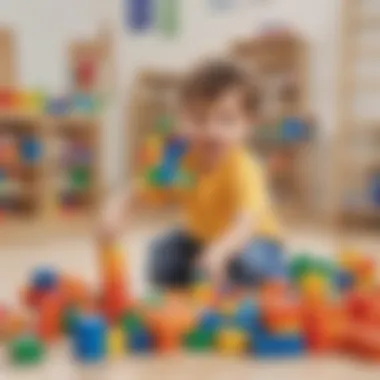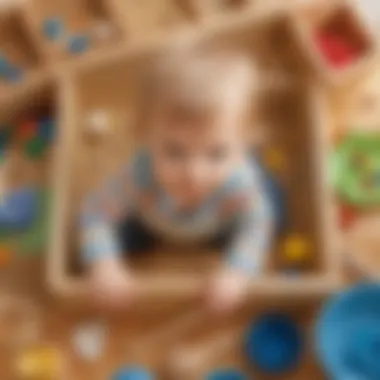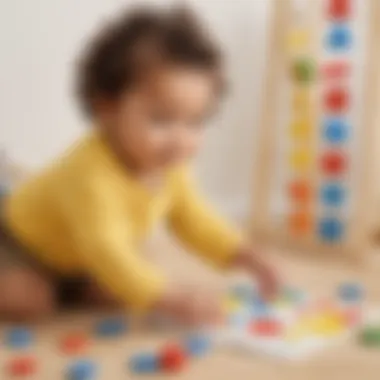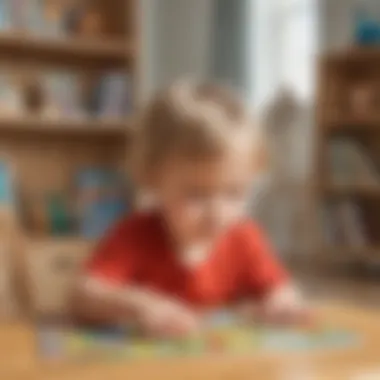Exciting Games to Spark Creativity in 2-Year-Olds


Fun Activities Ideas
Engaging 2-year-olds in fun activities can be both enriching and stimulating. Indoor activities offer a safe space for exploration and learning. From creating imaginative forts with blankets to setting up a mini obstacle course using pillows, there are endless possibilities to keep the young ones entertained while promoting physical development. Outdoor adventures present opportunities for fresh air and exploration - a nature scavenger hunt or a simple game of tag can ignite a sense of curiosity and wonder in the little adventurous souls. Arts and crafts activities contribute to sensory development and self-expression. Simple activities like finger painting or creating collages with textured materials can unleash creativity while enhancing fine motor skills. Science experiments provide a hands-on approach to learning. Mixing colors using food coloring and water or exploring sink and float concepts with household items can make learning fun and engaging. Cooking and baking activities not only teach valuable life skills but also introduce mathematical concepts like measuring and counting in a practical setting.
Educational Games
Incorporating educational games into playtime can foster cognitive development in 2-year-olds. Math and logic games, such as sorting shapes or stacking blocks based on size, help build early numeracy skills and critical thinking. Language and vocabulary games like 'I Spy' encourage language development and word recognition. STEM activities bring together elements of science, technology, engineering, and mathematics to introduce young minds to a world of discovery. History and geography puzzles can be simplified for young children, fostering an early interest in the world around them. Interactive learning apps provide a digital approach to education, offering a blend of entertainment and learning opportunities tailored to the developmental needs of toddlers.
Seasonal and Holiday Activities
Seasonal and holiday-themed activities add a touch of festivity to playtime. Valentine's Day crafts, such as making heart-shaped cards or creating handmade gifts, can instill a sense of love and generosity in children. Halloween costume ideas spark imagination and creativity, with dress-up play enhancing social and emotional development. Thanksgiving cooking projects introduce the concept of gratitude and sharing, as children participate in preparing simple dishes. Christmas decorations offer a chance for families to bond over festive adornments, creating joyful memories together. New Year's resolutions for kids encourage goal-setting and reflection, promoting personal growth and self-awareness.
Parenting Tips and Resources
Parenting is a journey filled with learning and growth. Encouraging creativity in children involves providing ample opportunities for exploration and self-expression. Setting up a playful learning environment at home can include designated play areas with a variety of educational toys and materials. Balancing screen time and playtime is crucial in maintaining a healthy lifestyle for children, ensuring a blend of physical activity and technology use. Building strong family bonds through shared activities like reading together or engaging in family outings fosters a sense of belonging and connection. Motivating kids to stay active involves encouraging outdoor play, sports, or even simple movement-based games to promote physical health and well-being.
Fun Facts and Trivia
Exploring fun facts and trivia can ignite a sense of wonder and curiosity in young minds. Delving into the animal kingdom unveils fascinating discoveries about various species and their habitats. Learning about famous inventions introduces children to the ingenuity and creativity of inventors throughout history. Discovering historical events tailored for kids offers a glimpse into the past through interactive storytelling and engaging narratives. Exploring mythical creatures taps into the realm of imagination and folklore, sparking creative thinking and storytelling skills. Embarking on space adventures and discoveries opens up a universe of knowledge about the cosmos and beyond, inspiring a love for science and exploration.
Prelims
Welcome to Gigglyx
Brief Description
Embark on a journey of discovery with Gigglyx, the hub of excitement for young learners. Gigglyx introduces innovative and creative ways to engage and stimulate 2-year-olds, fostering cognitive growth and physical dexterity effortlessly. Its commitment to wholesome play and learning sets it apart in the landscape of early childhood entertainment.


Detailed Description
Gigglyx immerses toddlers in a kaleidoscope of colors, sounds, and activities tailored to captivate youthful imaginations. Through a blend of interactive games, sensory experiences, and cognitive challenges, Gigglyx ensures an enriching playtime that nurtures holistic development in 2-year-olds.
Target Audience
Tailored for the discerning parents, guardians, and educators of 2-year-olds, Gigglyx provides a dynamic platform for engaging and educational play. Serving as a reliable ally in early childhood development, Gigglyx caters to those seeking to enrich their child's learning journey through purposeful and enjoyable activities.
Benefits of Play for 2-Year-Olds
Engaging in play holds immense significance in the developmental journey of 2-year-olds. At this tender age, play isn't just about having fun; it serves as a crucial tool for enhancing cognitive abilities, promoting physical coordination, and nurturing social and emotional growth. The interactive and educational games recommended in this article aim to stimulate young minds, encourage creativity, and foster a holistic development approach suitable for toddlers.
Enhanced Cognitive Development
Boosting Problem-Solving Skills:
Mastering problem-solving skills at a young age lays a robust foundation for a child's cognitive growth. By engaging in activities that challenge them to think critically and find solutions independently, toddlers learn to analyze situations, develop logical reasoning, and enhance their decision-making abilities, vital skills that will benefit them throughout their lives. Encouraging problem-solving skills in 2-year-olds not only sharpens their intellect but also instills a sense of accomplishment and boosts their confidence in tackling new challenges.
Improving Memory Retention:
Memory retention plays a pivotal role in a child's learning process. By participating in memory-enhancing games and tasks, 2-year-olds can strengthen their ability to recall information, events, and instructions. Improved memory retention not only aids in academic pursuits but also facilitates better understanding and application of knowledge in various contexts. Developing memory skills at a young age sets a strong foundation for future learning and cognitive development.
Enhancing Language Acquisition:
Language acquisition is a fundamental aspect of a child's cognitive development. Engaging young children in activities that promote language skills such as storytelling, singing, and engaging in conversations not only expands their vocabulary but also enhances their communication abilities. The ability to express thoughts and emotions effectively through language is crucial for social interaction, academic success, and overall cognitive growth. Encouraging language acquisition in 2-year-olds fosters linguistic diversity, cognitive flexibility, and a deeper understanding of the world around them.
Physical Coordination and Motor Skills
Improving Hand-Eye Coordination:


Developing hand-eye coordination is essential for a child's physical development and overall well-being. Activities that require hand-eye coordination, such as building blocks, threading beads, or catching a ball, help 2-year-olds refine their motor skills, enhance spatial awareness, and improve their dexterity. The ability to coordinate hand movements with visual stimuli not only aids in day-to-day tasks but also lays the groundwork for activities that demand precision and accuracy.
Developing Gross Motor Skills:
Gross motor skills involve the coordination of large muscle groups for activities like walking, running, jumping, and climbing. Encouraging 2-year-olds to engage in gross motor activities such as playing on playground equipment, dancing, or kicking a ball promotes physical fitness, balance, and spatial awareness. Developing gross motor skills at an early age strengthens muscle tone, improves coordination, and lays the foundation for a healthy and active lifestyle.
Social and Emotional Growth
Encouraging Sharing and Cooperation:
Learning to share and cooperate with others is a crucial aspect of a child's social development. Encouraging 2-year-olds to engage in activities that promote sharing toys, taking turns, and collaborating on tasks not only fosters positive social interactions but also cultivates empathy, teamwork, and emotional intelligence. Teaching the value of sharing and cooperation at a young age establishes a strong social foundation that helps children build stable relationships and navigate social dynamics effectively.
Fostering Empathy and Emotional Regulation:
Empathy and emotional regulation are essential skills for navigating the complex landscape of human emotions. By engaging in activities that prompt discussions about feelings, encouraging role-playing scenarios, and creating a supportive environment for emotional expression, 2-year-olds can develop empathy, understanding, and self-regulation. Fostering empathy and emotional regulation at a young age nurtures emotional intelligence, promotes healthy relationships, and equips children with the tools to manage their emotions effectively.
Top Fun Games for 2-Year-Olds
In the realm of engaging games for 2-year-olds, a world teeming with learning opportunities and joy awaits. These games are not mere pastimes but essential tools for fostering crucial developmental skills in our young ones. Whether it's honing cognitive abilities, refining motor skills, or nurturing social interactions, the games selected for this article are meticulously curated to provide a holistic approach to child development. As young minds absorb, adapt, and explore, these fun-filled activities stand as pillars of support, guiding them through a voyage of growth and discovery.
Sensory Play Activities
Exploring Textures with Sensory Bins
Delving into textures through sensory bins unveils a sensory-rich experience like no other. The tactile exploration offered by various materials encourages sensory awareness and fine motor skill development in toddlers. Lush fabrics, smooth wood, and cool metal stimulate their senses, fostering curiosity and expanding their cognitive horizons. While the messiness may seem daunting, the benefits of sensory play far outweigh any cleanup concerns, making sensory bins a must-have in the repertoire of engaging games for 2-year-olds.
Mess-Free Sensory Bags


Embracing the wonder of sensory play without the accompanying mess, sensory bags offer a tidy yet stimulating alternative. These transparent pouches filled with colorful gel beads or soft fabrics provide a mess-free sensory experience, ideal for both home and travel. Toddlers can squish, squeeze, and explore various textures, enhancing their sensory perception and dexterity. The convenience and versatility of sensory bags make them a favored choice among parents and educators seeking engaging yet tidy sensory activities for their little ones.
Interactive Storytelling
Puppet Shows and Fingerplays
Immersing 2-year-olds in the enchanting world of puppet shows and fingerplays sparks their imagination and cultivates a love for storytelling. Through the use of puppets and clever finger movements, children engage in creative narratives, developing language skills and emotional expression. The interactive nature of puppet shows fosters social interactions and communication, laying a foundation for future literacy and expressive arts. Puppet shows and fingerplays emerge as beacons of creativity in the landscape of interactive storytelling for young minds.
Create-Your-Own Storytime
Encouraging toddlers to craft their narratives through create-your-own storytime sessions ignites a passion for storytelling and self-expression. By providing prompts, props, and an open space for imagination, children delve into the realms of fantasy and adventure, constructing their tales. This process not only enhances cognitive abilities but also nurtures confidence and creativity. Create-your-own storytime sessions empower toddlers to become storytellers in their right, fostering a sense of autonomy and ingenuity.
Shape and Color Recognition Games
Sorting Shapes and Colors
Engaging toddlers in sorting shapes and colors lays the groundwork for essential cognitive and sensory development. By discerning between various shapes and colors, children sharpen their visual acuity and categorical understanding. This game not only enhances their problem-solving skills but also introduces them to early mathematical concepts. The simplicity and effectiveness of sorting shapes and colors make it a fundamental choice in the realm of early childhood education.
Color Matching Activities
The world of color matching activities opens new avenues of learning and creativity for 2-year-olds. By associating colors and patterns, children enhance their visual coordination and color recognition skills. Whether it's matching hues in a painting or grouping objects by color, this game promotes cognitive growth and artistic expression. The joys of color exploration and matching activities provide a structured yet vibrant platform for toddlers to engage with the world around them.
Finale
In the evanescent world of a toddler's playtime, the conclusion serves as a pivotal moment encapsulating fragments of countless games cherished. It underscores the transcendental significance of structured play in augmenting cognitive, physical, and emotional development. While bidirectional learning unfurls, the curiosity-infused environment nurtures holistic growth. Encouraging innate explorations shapes resilient problem-solving instincts, etching enduring memories defining the learning journey. The seamless amalgamation of playfulness and education forms an indelible bond between youthful learners and interactive stimuli, setting a precedent for holistic development.
Encouraging Playful Learning
Promoting Early Development
Intricately woven into the fabric of promoting early development lies the cornerstone of cognitive scaffolding. It lays the foundation for robust executive functioning, sharpening problem-solving acumen, memory retention, and language mastery. The symbiotic relationship between structured play and brain elasticity fortifies neural pathways, paving the way for agile information processing and inventive thinking. The hallmark of promoting early development rests in its adaptive nature, constantly evolving to cater to the dynamic learning needs of burgeoning intellects. The organically emergent nature of discovery fosters a sense of autonomy, instilling a lifelong love for learning and fostering self-directed growth.
Building Strong Parent-Child Bonds
A tender alliance shapes the bedrock of familial intimacy, exemplified through the conduit of building strong parent-child bonds. The intricate dance of reciprocal interaction imbues trust, forging emotional connections anchored in shared experiences. Nurturing strong bonds kindles empathetic avenues of expression, fostering emotional resilience and secure attachments. The effervescent milieu of joyous play consolidates familial cohesion, bridging generational gaps through shared laughter and exploration. The transformative power resides in the shared moments of triumph and setback, seeding values of perseverance and collaboration within familial narratives. Embracing vulnerability within the harmonious play scape nurtures emotional intelligence and nurtures resilience in the face of challenges.



